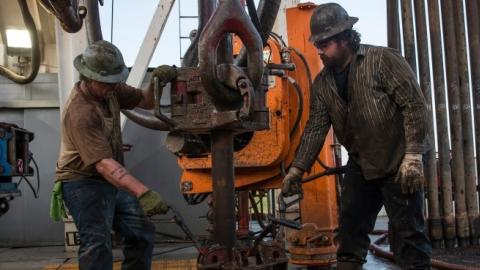The last officials have left Vienna after the Organization of the Petroleum Exporting Countries, or OPEC, summit on June 5. The shock waves from their historic decision to maintain oil production at current levels continue, and will resound for a long time — but not in the way they hoped.
Thanks to the U.S. shale oil revolution, the world has witnessed a glut of oil and a year-long drop in global prices — almost 50 percent from last May. So oil ministers from Saudi Arabia, Iran, Venezuela and other OPEC members are betting that by continuing production at 30 million barrels a day they can keep that global crude price down at a level where producers in places like the Bakken field in North Dakota and Eagle Ford in Texas, can't make a profit.
After all, the American shale boom started with prices in the $80-100 barrel range. Saudi Arabia can still make money pumping oil at $5 a barrel. Most other OPEC countries would prefer a higher price than the current $65 or so a barrel to keep their one-product economies going, but they've acquiesced with the Saudi plan to use low prices to squeeze those U.S. producers out of the fracking business, and restore OPEC's dominance of the global oil market.
On the face of it, the plan seems to be working already. According to the Journal of Petroleum Technology, U.S. shale producers have cut spending, idled more than half the country's rigs, and cut thousands of jobs. U.S. oil production, which averaged 9.3 million barrels per day as recently as March, is now expected to slide so fast that 2016 growth will be only a quarter of what was expected.
But to hope, as OPEC does, that this presages disaster for the American shale industry and the bursting of the "shale bubble," as some critics call it, misses the point — and the true nature of the shale and fracking revolution. U.S. shale production is still projected to grow, even with low prices. And if prices rise, those producers can rapidly ramp up not only production from current wells but exploration for new ones much faster than conventional producers can. They can also return idled workers to good-paying jobs on a much shorter timeline.
"The shale industry is like a sprinter — very agile," ConocoPhilips CEO Ryan Lance explained to Bloomberg, while "major oil companies are like marathon runners" who are heavily invested for the long haul, and find it very difficult to dip in and out of exploration and production in response to quick price swings.
In addition, the shale industry's driving technologies — hydraulic fracking and horizontal drilling — are becoming more efficient and cost-effective by the year. Top operators say they can produce more profitably today at $65 a barrel than they could at $95 a barrel back in 2012. Imagine what they'll be able to achieve in another three years, even at $40 barrel.
Like the marathon runner, OPEC can run farther — that is, pump more conventional oil. But it can't go much faster, even though the oil market increasingly belongs to the quick and the strong.
The result, ironically, is that when OPEC tries to shove the price lower it only forces U.S. energy companies to do what they do — use technology to increase production and lower costs. This means the fracking revolution will only gather more momentum.
So in the end, it's OPEC, not American shale, that's on the fool's errand.
If OPEC really wants to make a dent in U.S. energy production, the best way is to invest in the U.S. environmental lobby, which is on an anti-fracking crusade that owes more to fanaticism than science. This is what Vladimir Putin has done with the green movement in Europe, to halt fracking there, and what Qatar recently did with its sponsorship of Hollywood's best known anti-fracking movie, Matt Damon's "Promised Land."
But until the Sierra Club opens its new headquarters in Riyadh, look for U.S. shale oil production to continue to sprint ahead, with America's dominance of world's energy markets as the finish line.
















